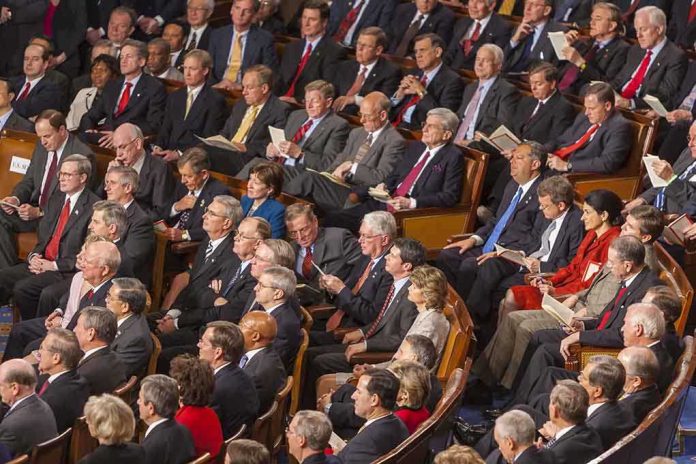
South Korea’s proposed tech regulations unfairly target American companies while giving Chinese competitors a free pass, prompting urgent action from over 40 Republican lawmakers concerned about national security and economic competitiveness.
Key Takeaways
- More than 40 Republican lawmakers have warned that South Korea’s Platform Competition Promotion Act (PCPA) targets U.S. tech giants like Google and Apple while exempting Chinese competitors.
- The bipartisan effort led by Representatives Adrian Smith and Carol Miller urges the Trump administration to address these discriminatory regulations in upcoming trade negotiations.
- Critics argue the legislation mirrors the European Union’s Digital Markets Act, potentially benefiting the Chinese Communist Party at America’s expense.
- South Korea is currently seeking an extension to a 90-day tariff pause, with President Trump expected to make a decision next week.
- Lawmakers warn that allowing Chinese tech companies to operate without similar regulatory burdens increases threats related to data security, disinformation, and espionage.
Republicans Sound Alarm on South Korea’s Tech Regulations
A growing chorus of Republican lawmakers is raising serious concerns about South Korea’s proposed Platform Competition Promotion Act, legislation they believe could severely disadvantage American technology companies while giving Chinese competitors an unfair advantage. The regulatory framework, championed by South Korean President Lee Jae-Myung, has drawn criticism for imposing stringent requirements on U.S. digital giants like Google, Apple, and Meta while apparently exempting Chinese companies such as ByteDance and Alibaba from the same scrutiny.
“The legislation mirrors the European Union’s blatantly discriminatory Digital Markets Act and would impose disparate legal and enforcement standards designed to undermine innovative business models and disadvantage successful American companies,” wrote Nebraska Rep. Adrian Smith, Chair of the House Ways & Means Trade Subcommittee, and Rep. Carol Miller, R-W.V.
This regulatory disparity has prompted a bipartisan coalition of more than 40 lawmakers to draft a letter to the Trump administration, urging immediate action to protect American technological interests. The letter, addressed to the U.S. Trade Representative, Treasury Secretary, and Commerce Secretary, calls for these concerns to be prioritized during upcoming trade negotiations with South Korea. The timing is particularly critical as South Korea seeks an extension to a 90-day tariff pause, with President Trump expected to announce his decision next week.
National Security Implications
The potential favoritism toward Chinese tech companies carries significant national security implications that extend beyond mere economic competition. The congressional letter warns that the legislation “would also advance the interests of the Chinese Communist Party (CCP),” according to more than 40 lawmakers who signed the document. This concern stems from the apparent regulatory double standard that would impose burdens on American companies while allowing Chinese competitors to operate with greater freedom in the South Korean market.
“Allowing these companies to operate free from the regulatory burdens imposed on their U.S. competitors would substantially increase threats related to data security, disinformation, economic coercion, and espionage stemming from the CCP’s influence over such Chinese tech giants,” warned the group of more than 40 lawmakers.
U.S. officials point to the well-documented connections between major Chinese technology companies and the Chinese government, raising legitimate questions about data security and potential surveillance capabilities. The concern is that by disadvantaging American companies, South Korea could inadvertently strengthen China’s technological foothold in the region, compromising not only economic interests but also critical security infrastructure. This asymmetric regulatory approach threatens to undermine America’s technological leadership position while emboldening strategic competitors.
Trade Relations at a Crossroads
The controversy over South Korea’s Platform Competition Promotion Act comes at a pivotal moment in U.S.-South Korean trade relations. With South Korea actively seeking an extension to the temporary tariff relief currently in place, President Trump faces a significant decision that could reshape the economic relationship between the two allies. The congressional push reflects growing frustration among American policymakers who believe the proposed regulations unfairly target U.S. companies while giving Chinese competitors preferential treatment.
The situation mirrors broader concerns about international regulatory frameworks that disproportionately affect American technology companies. Similar to the European Union’s Digital Markets Act, which has been criticized for primarily targeting U.S. tech giants, South Korea’s approach risks creating a fragmented global digital landscape where American innovation is penalized while competitors from authoritarian regimes face fewer restrictions. This regulatory imbalance threatens not just individual companies but America’s overall competitive position in the global technology race.



